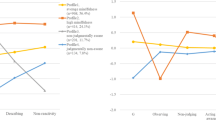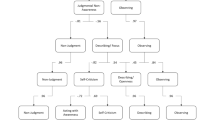Abstract
The Mindfulness Inventory: Nine Dimensions (MI:ND) provides a precise and comprehensive assessment tool relevant to understanding how mindfulness may affect psychological and behavioral outcomes. The MI:ND includes multidimensional measures of: (1) the core components of mindful attention and (2) proximal outcomes of mindfulness related to changes in emotion regulation. Core mindfulness dimensions include: Present awareness, Willingness/acceptance, Metacognition, Quiet mind, Non-judgment of self, and Non-judgment of others. Proximal outcomes of mindfulness include: (low levels of) Experiential avoidance, Distress tolerance, and (low levels of) Emotion-driven impulsivity. The MI:ND was initially validated in a sample of university students. Subsequently, the MI:ND has been used in empirical research in further samples of university students and also jail inmates. Evidence of psychometric properties from these samples is presented, including validity and reliability. Eight of the nine subscales have demonstrated adequate internal consistency across samples. The Metacognition subscale has shown poor internal consistency but adequate test-retest reliability and concurrent validity. Evidence to date suggests that the MI:ND may be a useful comprehensive measure of mindfulness assessing both core features of mindfulness and proximal outcomes in the domain of emotion regulation – theoretical mechanisms of action potentially explaining the benefits of mindfulness.
Similar content being viewed by others
References
Arch, J. J., & Craske, M. G. (2006). Mechanisms of mindfulness: Emotion regulation following a focused breathing induction. Behaviour Research and Therapy, 44(12), 1849–1858. https://doi.org/10.1016/j.brat.2005.12.007
Baer, R. A., Smith, G. T., & Allen, K. B. (2004). Assessment of mindfulness by self-report: The Kentucky inventory of mindfulness skills. Assessment, 11, 191–206.
Baer, R. A., Smith, G. T., Hopkins, J., Krietemeyer, J., & Toney, L. (2006). Using self-report assessment methods to explore facets of mindfulness. Assessment, 13, 27–45.
Baer, R. A., et al. (2008). Construct validity of the five facet mindfulness questionnaire in meditating and nonmeditating samples. Assessment, 15(3), 329–342.
Baer, R. A., Walsh, E., & Lykins, E. L. B. (2009). Assessment of mindfulness. In F. Didonna (Ed.), Clinical handbook of mindfulness (pp. 153–168). Springer Science + Business Media. https://doi.org/10.1007/978-0-387-09593-6_10
Bishop, S. R., Lau, M., Shapiro, S., Carlson, L., Anderson, N. D., Carmody, J., Segal, Z. V., Speca, M., Velting, D., & Devins, G. (2004). Mindfulness: A proposed operational definition. Clinical Psychology: Science and Practice, 11(3), 230–241.
Bowen, S., Chawla, N., & Marlatt, G. A. (2011). Mindfulness-based relapse prevention for addictive behaviors: A Clinician’s guide. The Guilford Press.
Brown, K. W., & Ryan, R. M. (2003). The benefits of being present: Mindfulness and its role in psychological well-being. Journal of Personality and Social Psychology, 84(4), 822–848.
Brown, R. A., Lejuez, C. W., Kahler, C. W., & Strong, D. R. (2002). Distress tolerance and duration of past smoking cessation attempts. Journal of Abnormal Psychology, 111(1), 180.
Brown, K. W., Ryan, R. M., & Creswell, J. D. (2007). Mindfulness: Theoretical foundations and evidence for its salutary effects. Psychological Inquiry, 18, 211–237.
Brown, R. A., Palm, K. M., Strong, D. R., Lejuez, C. W., Kahler, C. W., Zvolensky, M. J., Hayes, S. C., Wilson, K. G., & Gifford, E. V. (2008). Distress tolerance treatment for early-lapse smokers rationale, program description, and preliminary findings. Behavior Modification, 32(3), 302–332.
Buchheld, N., Grossman, P., & Walach, H. (2001). Measuring mindfulness in insight meditation (Vipassana) and meditation-based psychotherapy: The development of the Freiburg Mindfulness Inventory (FMI). Journal for Meditation and Meditation Research, 1, 11–34.
Chadwick, P., Hember, M., Mead, S., Lilley, B., & Dagnan, D. (2005). Responding mindfully to unpleasant thoughts and images: Reliability and validity of the Mindfulness Questionnaire. Unpublished manuscript.
Chambers, R., Gullone, E., & Allen, N. B. (2009). Mindful emotion regulation: An integrative review. Clinical Psychology Review, 29, 560–572.
Chödrön, P. (1991). The wisdom of no escape. Shambhala Publications.
Cyders, M. A., & Smith, G. T. (2008). Emotion-based dispositions to rash action: Positive and negative urgency. Psychological Bulletin, 134, 807–828.
Davis, K. M., Lau, M. A., & Cairns, D. R. (2009). Development and preliminary validation of a trait version of the Toronto Mindfulness Scale. Journal of Cognitive Psychotherapy: An International Quarterly, 23, 185–197.
Edwards, J. R., & Bagozzi, R. P. (2000). On the nature and direction of relationships between constructs and measures. Psychological Methods, 5, 155–174.
Feldman, G., Hayes, A., Kumar, S., Greeson, J., & Laurenceau, J. (2007). Mindfulness and emotion regulation: The development and initial validation of the Cognitive and Affective Mindfulness Scale-Revised (CAMS-R). Journal of Psychopathology and Behavioral Assessment, 29, 177. https://doi.org/10.1007/s10862-006-9035-8
Hanh, T. N. (1987). Being peace. Parallax Press.
Harty, L., Youman, K., Malouf, E., Appel, M., Hall, S., Pilafova, A., & Tangney, J. P. (2009). Mindfulness Inventory: Nine Dimensions (MIND). Fairfax, VA: George Mason University.
Hayes, S. C., Wilson, K. W., Gifford, E. V., Follette, V. M., & Strosahl, K. (1996). Experiential avoidance and behavioral disorders: A functional dimensional approach to diagnosis and treatment. Journal of Consulting and Clinical Psychology, 64(6), 1152–1168.
Hayes, S. C., Strosahl, K., & Wilson, K. G. (1999). Acceptance and commitment therapy: An experiential approach to behavior change. The Guilford Press.
Hayes, S. C., Strosahl, K. D., Wilson, K. G., Bissett, R. T., Pistorello, J., Toarmino, D., Polusny, M., Dykstra, T. A., Batten, S. V., Bergan, J., Stewart, S. H., Zvolensky, M. J., Eifert, G. H., Bond, F. W., Forsyth, J. P., Karekla, M., & McCurry, S. M. (2004). Measuring experiential avoidance: A preliminary test of a working model. The Psychological Record, 54, 553–578.
Kabat-Zinn, J. (1990). Full catastrophe living: Using the wisdom of your body and mind to face stress, pain, and illness. Pub. by Dell Publishing, a division of Bantam Doubleday Dell Pub. Group.
Keng, S. L., Smoski, M. J., & Robins, C. J. (2011). Effects of mindfulness on psychological health: A review of empirical studies. Clinical Psychology Review, 31(6), 1041–1056. https://doi.org/10.1016/j.cpr.2011.04.006
Lappalainen, R., Lehtonen, T., Skarp, E., Taubert, E., Ojanen, M., & Hayes, S. C. (2007). Acceptance and Action Questionnaire-8 [Database record]. Retrieved from PsycTESTS https://doi.org/10.1037/t20729-000
Linehan, M. (1993). Cognitive-behavioral treatment of borderline personality disorder. Guilford Press.
Malouf, E. T., Youman, K., Stuewig, J., Witt, E. A., & Tangney, J. P. (2017). A pilot RCT of a values-based mindfulness group intervention with jail inmates: Evidence for reduction in post- release risk behavior. Mindfulness, 8, 603–614.
Settles, R. E., Fischer, S., Cyders, M. A., Combs, J. L., Gunn, R. L., & Smith, G. T. (2012). Negative urgency: A personality predictor of externalizing behavior characterized by neuroticism, low conscientiousness, and disagreeableness. Journal of Abnormal Psychology, 121(1), 160–172. https://doi.org/10.1037/a0024948
Tangney, J. P., Dobbins, A. E., Stuewig, J. B., & Schrader, S. W. (2017). Is there a dark side to mindfulness? Relation of mindfulness to criminogenic cognitions. Personality and Social Psychology Bulletin, 43(10), 1415–1426. https://doi.org/10.1177/0146167217717243
Teasdale, J. D., Moore, R. G., Hayhurst, H., Pope, M., Willams, S., & Segal, Z. V. (2002). Metacognitive awareness and prevention of relapse in depression: Empirical evidence. Journal of Consulting and Counseling Psychology, 70, 275–287.
Vujanovic, A. A., Bonn-Miller, M. O., Potter, C. M., Marshall, E. C., & Zvolensky, M. J. (2011). An evaluation of the relation between distress tolerance and posttraumatic stress within a trauma-exposed sample. Journal of Psychopathology and Behavioral Assessment, 33(1), 129–135.
Author information
Authors and Affiliations
Editor information
Editors and Affiliations
Rights and permissions
Copyright information
© 2022 Springer Nature Switzerland AG
About this entry
Cite this entry
Malouf, E.T., Tangney, J.P., Monfort, S.S., Yarbro, J.L., Youman, K., Schrader, S.W. (2022). The Mindfulness Inventory: Nine Dimensions (MI:ND). In: Medvedev, O.N., Krägeloh, C.U., Siegert, R.J., Singh, N.N. (eds) Handbook of Assessment in Mindfulness Research. Springer, Cham. https://doi.org/10.1007/978-3-030-77644-2_26-1
Download citation
DOI: https://doi.org/10.1007/978-3-030-77644-2_26-1
Received:
Accepted:
Published:
Publisher Name: Springer, Cham
Print ISBN: 978-3-030-77644-2
Online ISBN: 978-3-030-77644-2
eBook Packages: Springer Reference Behavioral Science and PsychologyReference Module Humanities and Social SciencesReference Module Business, Economics and Social Sciences




